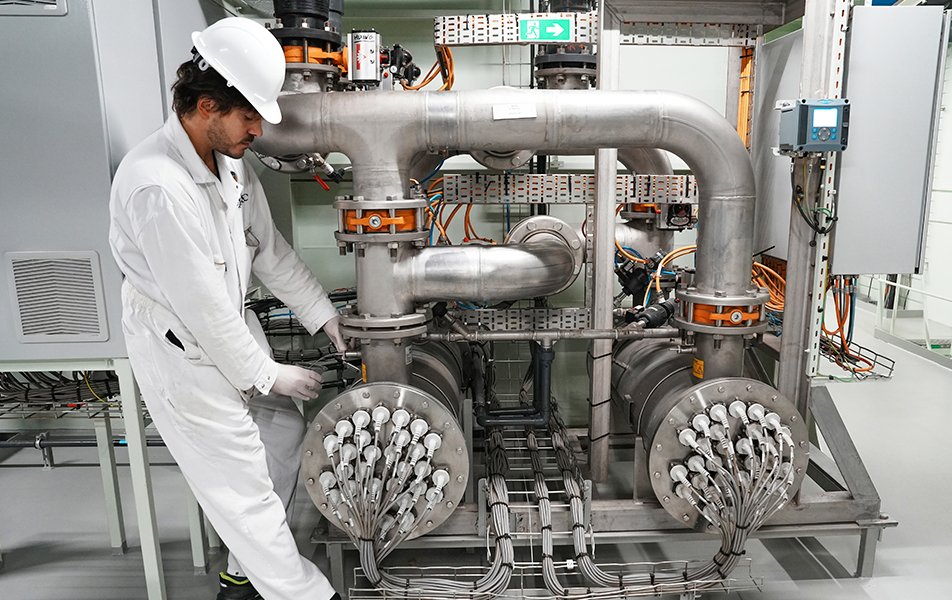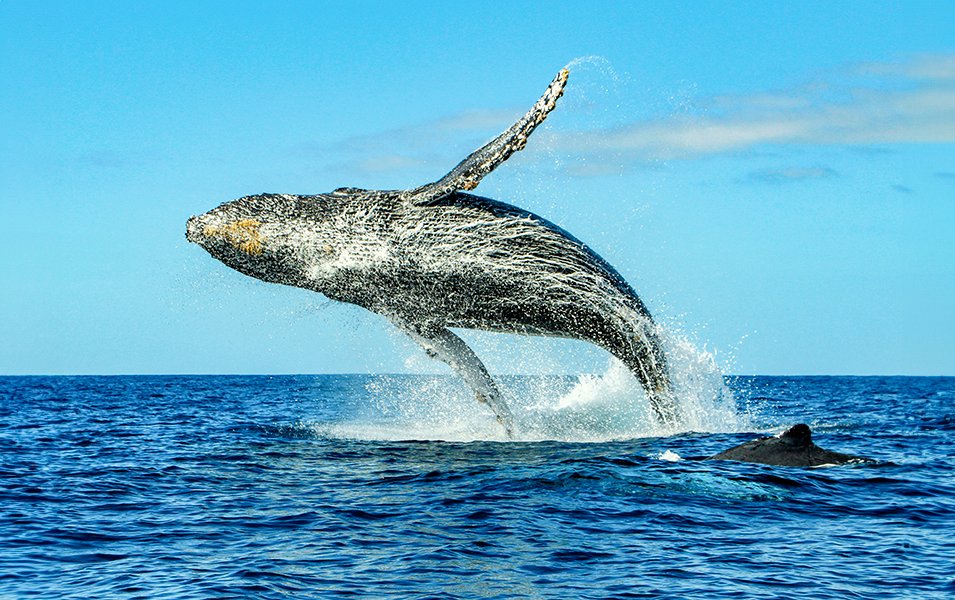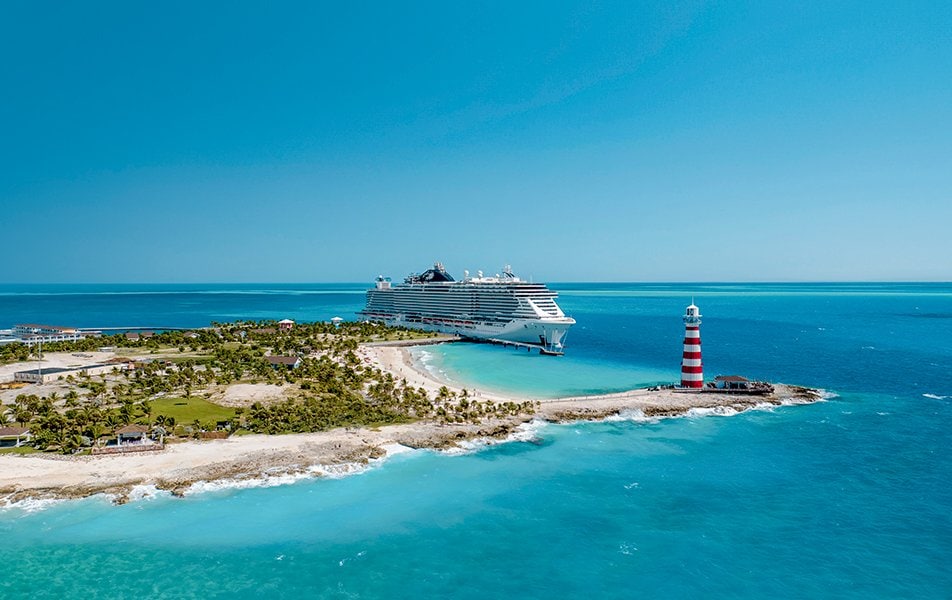PLANET
Commitment to environmental protection
This section focuses on the company’s commitment to environmental protection and pollution prevention. Promoting ocean diversity and playing our part in protecting the planet is critical to our business, and we are determined to play our role and contribute to global efforts. We identify and implement practices for pollution prevention as well as supporting initiatives that protect marine and plant ecosystems.
WATER AND WASTEWATER MANAGEMENT
Effective water and wastewater management on cruise ships is essential in preventing pollution of the oceans and ensuring the health and safety of passengers and crew. Proper treatment and disposal of wastewater safeguards marine ecosystems, and we are committed to comply with strict international and local regulations to protect against environmental damage.
CREATING FRESH WATER
More than 80% of all the freshwater we use across our feet is from seawater.
Every day on our ships, we transform millions of litres of seawater into fresh drinking water through reverse osmosis and evaporation. Reverse osmosis involves pushing seawater through a fine membrane to remove salt, whilst evaporation involves heating seawater until it turns into vapour. Both methods effectively produce fresh water from seawater on cruise ships, ensuring a sustainable water supply and reducing our reliance on shore-based sources.
We aim to reduce on board water usage by 3% per year across our fleet using water saving devises in bathrooms and kitchens and by encouraging water-saving practices among guests and crew.
TREATING OUR WASTEWATER
After use, onboard water is treated before returning to the ocean. Our fleet is fully compliant with wastewater discharge rules wherever it operates. Our four newest ships comply with the ‘Baltic Standard’ (IMO MEPC 227 (64), the strictest standard for wastewater treatment and discharge in the maritime industry.
We have a strict internal policy not to dispose of bilge and treated oily water at sea. Instead, we discharge ashore so it can be properly treated at approved facilities. We undertake random testing of treated effluent water to ensure standards are maintained.
TREATING BALLAST WATER
Ballast tanks on cruise ships help to maintain the centre of gravity and level of comfort on the vessel during its voyage. Adjusting the position of the ship in the water can improve the ship’s energy efficiency.
These tanks are filled with seawater, which can contain small invertebrates, larvae and other microorganisms collected from local ecosystems. To prevent the risk of these organisms being introduced to new areas of ocean, all our ships have an approved ballast water treatment system, which uses mechanical filtration, ultraviolet light, and chemical treatment to remove these microorganisms and eliminate this risk.
WASTE MANAGEMENT
Responsible waste management on a cruise ship involves carefully handling, reducing, recycling, and disposing of all waste materials generated onboard. This includes food waste, recyclable materials like paper and plastic, cooking oils and hazardous waste. The aim is to minimise our potential environmental impact and comply with strict industry-specific regulations. Recyclable materials including glass, aluminium, paper and cardboard, plastics, cooking oil and operational waste are compacted or fragmented rand offloaded ready to be recycled.
As a result of these comprehensive waste management policies and procedures, our entire fleet has achieved ISO 21070:2017 certification for marine environmental protection. ISO 21070:2017 is an international standard providing guidelines for the management of solid ship-generated waste, to help minimise the environmental impact. It specifies procedures for handling, storage, treatment, and disposal of waste on board ships, aiming to improve waste management practices in the maritime industry.
WATER AND WASTEWATER MANAGEMENT

WHALE PROTECTION
We partner with Ocean Research & Conservation Association (ORCA) a charity that’s entirely dedicated to studying and protecting whales, dolphins and porpoises in the oceans. ORCA have developed a comprehensive ship strike mitigation training programme for the deck officers across the fleet to understand the whales they are encountering during their voyages and the best ways of reducing the risk of collision, which is not only limited to speed reductions. MSC bridge officers have access to the ORCA OceanWatchers app, to allow them to records sightings of whales and dolphins during their voyages.
To protect endangered sperm whales and OceanCare in the eastern Mediterranean Sea; we have rerouted our ships when they operate in this area between April and October. This follows discussions with the International Fund for Animal Welfare, Pelagos Cetacean Research Institute, OceanCare, and World Wide Fund for Nature Greece.
WHALE PROTECTION

MARINE CONSERVATION ON OCEAN CAY
Ocean Cay MSC Marine Reserve is not only a private island destination but is also home to the MSC Foundation’s Super Coral Programme.
Pioneering scientific collaboration and advanced research have identified coral genotypes known as ‘super corals’ which have evolved to better withstand thermal stress. At Ocean Cay, we're growing critically endangered coral in offshore nurseries to be planted across 64 square miles of the surrounding marine environment. These will be strategically planted to create hardier reefs, more resilient to the extreme heat events of climate change, known as ‘marine heatwaves’. A full-time Marine Research Programme Manager has been recruited to lead restoration activities on Ocean Cay and to support our broader biodiversity initiatives.
In recognition of the pioneering work done with some of the world’s leading marine biologists, Ocean Cay was formally designated a ‘Hope Spot’ by Mission Blue, the non-profit organisation promoting the protection of marine ecosystems. Ocean Cay joins Mission Blue’s global network of 154 Hope Spots: places recognised as critical to ocean health with the goal of achieving the status of MPA.
Please visit our MSC Foundation website for more information on their conservation programs.
MARINE CONSERVATION ON OCEAN CAY



